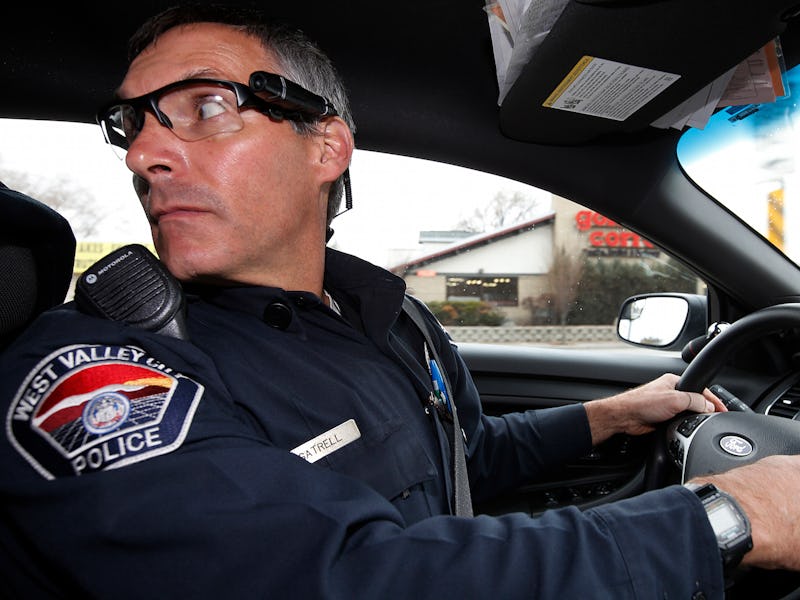Aside from Cops, Who Should Wear Body Cameras to Work?
Who should wear body cameras to work?

The first time someone told me I should be wearing a camera, I was biking in downtown Toronto, kvetching about drivers with a fellow cyclist, a stranger, at a stoplight. She was an older woman, decked out in reflectors, with a camera mounted on her helmet. You should always wear one, she said, so in case of an accident, they know you were in the right.
This, I realized even then, was a charitable assumption that if a car were to run into me, or door me, or clip me, or what have you, it presumably would be the driver's fault. This is generally true: Someone who cuts a fair amount of corners as a cyclist on city streets, as I do (rolling through stop signs and red lights, for instance, after checking fanatically for cross-traffic) is doing far more calculations in his head than the average driver, and taking far more care, move-for-move on the road. I'm also tougher to see than a car, and of course have more at risk in such a collision. Chances are a camera would catch some useful evidence in case of, oh, say, getting doored by a taxi at Union Square.
This is the other side of having a body camera: Unlike police, whose body cameras are largely to observe their behavior on the job, other occupations should consider them for offense, defense, or something between:
— Bouncers. The worst among them consider themselves edge-of-the-world cops minus the training or accountability. Maybe not every bouncer at every club needs to be yoked with a camera, but what about joints like the south Florida beach bars where grunts take people apart with impunity? Here's a 2013 account from a guy who says five bouncers worked him over: "The guy knocked me in the back of the head, and I went down unconscious. Then I woke up, and they were kicking me in the stomach, in the ribs, in the balls, in my head. Five guys on one. They just wanted to kill someone that night." Without cameras it's your slurred word against five security dudes. Bars that receive complaints would do well to body-cam their hired muscle.
— Bike messengers. They're like open-air human versions of Russian dash cam supercuts. But the caveat still applies: If you're the one breaking the laws, it may not be the best practice to roll around creating evidence.
— Umpires. Maybe they'll audit their own calls after the fact; maybe they'll let us do it. But the ump's-eye-view is a strangely hypnotic way to watch a game in any case.
— Train engineers. Amtrak is moving to outfit trains with the nearest thing to body cameras in the wake of the Northeast Regional train 188 crash in May, putting cameras in the cabs with the people who drive 'em. That's a fine start, but the best way to get a timeline of an engineer's decision-making is first-person video and audio. As the Associated Press reports: "The [National Transportation Safety Board] first recommended requiring audio recordings of sound in locomotive cabs following a 1996 collision between commuter train and an Amtrak train in Silver Spring, Maryland. None of the commuter train's operating crew members survived, and the board was unable to determine their actions leading up to the crash."
— Bartenders. Workplace assaults dropped consistently and widely in the United States between 1993 and 2009, per this Department of Justice report, but outside of people who deal directly with criminals and the mentally ill, bartenders faced some of the highest rates of on-the-job violence. They're also likely to be threatened and robbed. Something about getting people intoxicated for a living raises the prospect of seeing the shittier sides of humanity. On the bright side: The B-roll would be some of the finest of any occupation. Because funny things happen when a guy walks into a bar.
— Loggers. Another highly dangerous occupation in which small slips lead to death/dismemberment/insurance claims. And when things go right, the view is a hell of a thing to behold.